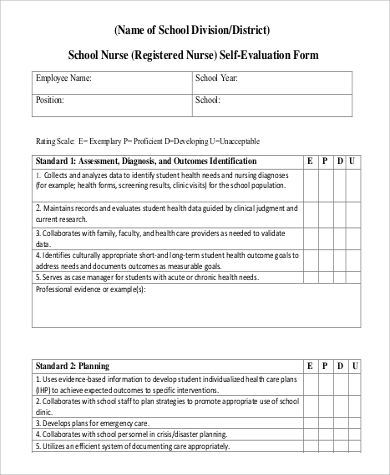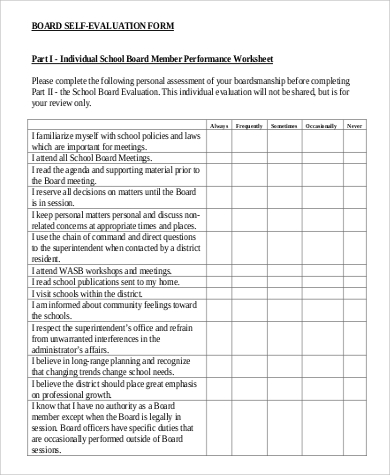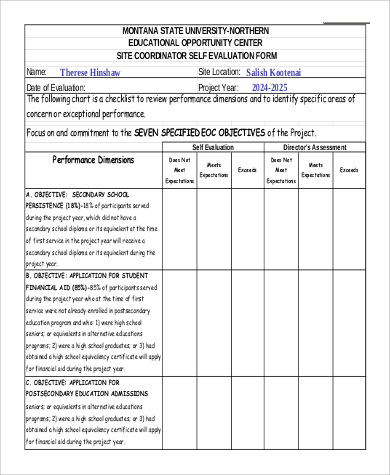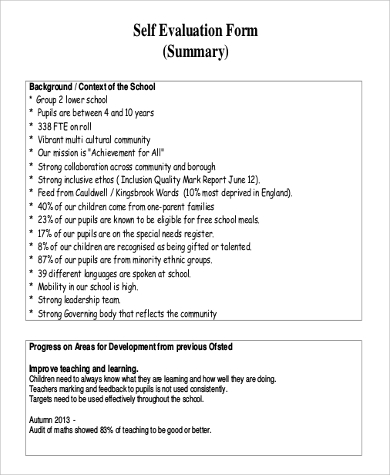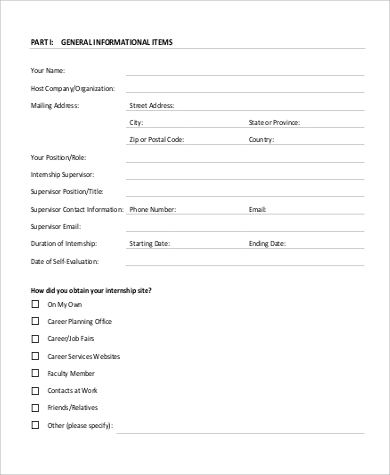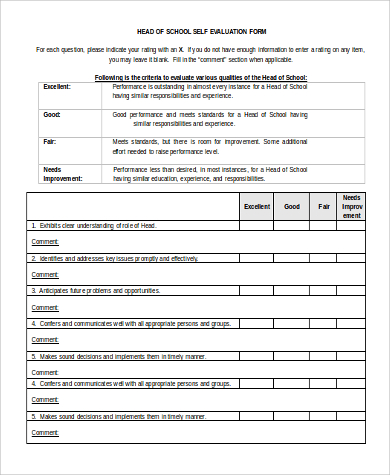Monitoring your students’ learning progress involves scrutinizing their class standing and performance regularly. A method employed by many educational institutions is the student self-evaluation. It is a simple yet effective process in which the student evaluates himself and identifies his own strengths and weaknesses. He will also be the one who will provide suggestions on what he can do to improve and excel in class.
If you are new to the teaching profession and want to implement student self-evaluations as a means of assessing your students’ performance in your class, these Sample Forms can help you in creating your own documents.
Sample School Registered Nurse Self-Evaluation Form
School Board Self-Evaluation Form in PDF
Secondary School Self-Evaluation Form Example
Free School Self-Evaluation Form Summary
School Student Self-Evaluation of Internship Form
There are many benefits that come with having your students answer self-evaluation forms periodically to determine where they stand in class, and more importantly, know their individual strengths and weaknesses. Much like the content in the Sample Evaluation Forms shown on this page, the questions presented on student self-evaluation forms serve to aid students in being able to rate and assess themselves.
Here are some of the benefits that can be reaped from having your students conduct a self-evaluation:
- Students are able to find out their areas for improvement in a timely manner. When a student conducts a self-evaluation, they get to look into the efforts they put into schoolwork, as well as assess their overall performance, in real time. As a result, they are able to address such areas for improvement promptly, helping them get back on track with their class standing.
- Students can come up with their own ways on how to address their areas for improvement. A question commonly asked in a student self-evaluation form is, “What can you do to improve?” That being said, students get to devise their own strategies in catching up and bolstering their class standing. However, as their teacher, you must bear in mind that you will also need to guide them.
Head of School Self-Evaluation Form to Download
Sample High School Counselor Self-Evaluation Form
Students are able to grasp the fact that they alone are responsible for their own learning. Self-evaluations allow students to realize that the pace and outcome of their learning is greatly dependent upon them and the efforts they put into their schoolwork. Moreover, they will be able to understand the fact that their teacher is merely there to guide them and to make sure that they are on track.
Classroom discourse is encouraged. Because students become aware of their strengths and weaknesses through the self-evaluation, it is more likely that they will raise questions to you and even to their fellow classmates. As a result, communication within the classroom is strengthened, and an environment of encouragement and helpfulness can also be built in the process.
You, as the teacher, will also find out whether or not your teaching style and techniques are effective. Similar to Candidate Evaluation Forms, which serve to assess the competence of a candidate, as well as look into their capability to deliver, a student self-evaluation may also benefit the teacher as it indirectly evaluates their own teaching manner. In a way, how the student rates himself can be a reflection of the effectiveness of his teacher.
Related Posts
Agreement Form Samples & Templates
Vehicle Inspection Forms Samples & Templates
Sample Employee Advance Forms
Sample Child Travel Consent Forms
Sample Testimonial Request Forms
Sample Employee Details Forms
Sample Divorce Forms
Sample Attestation Forms
Employee Performance Appraisal Form Templates
FREE 9+ Sample Presentation Evaluation Forms in MS Word
FREE 10+ School Admission Form Samples & Templates in MS Word | PDF
FREE 30+ Patient Consent Form Samples in PDF | MS Word
FREE 10+ Sample Sign Off Form Templates in PDF | MS Word
FREE 11+ Sample Medical Consultation Forms in PDF | MS Word
FREE 8+ Sample Donation Forms in PDF | MS Word
